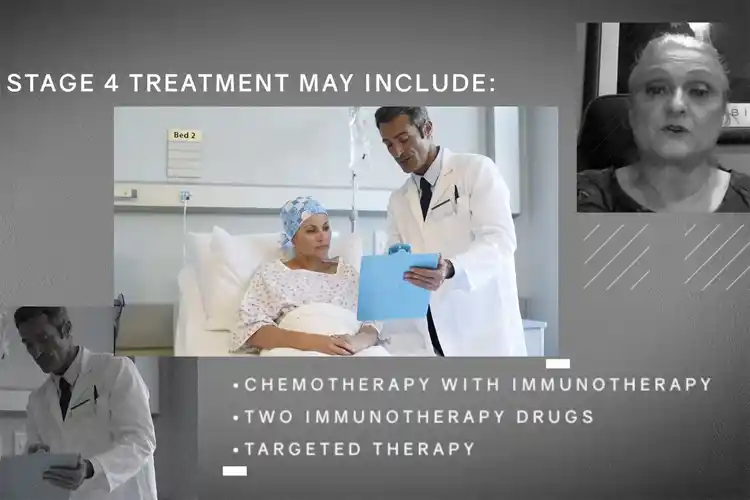What Is Combination Therapy for Lung Cancer?

Hide Video Transcript
Video Transcript
[MUSIC PLAYING]
There are two things to take into consideration. One thing is, which type of lung cancer the patient has? The other one is, what stage the patient is at diagnosis. That is going to determine what kind of treatment the patient needs. For the earliest stages, for stage one, if the patient can undergo surgery, that's what's going to be the recommended treatment. Now, after surgery, some patients need post-operative treatment. And that could include a combination of two chemotherapies and/or chemotherapy with a targeted therapy.
Now, as we go into later stages, like the stage three, surgery may not be an option. So patients may get a combination of chemotherapy with radiation. And then, after that, they're followed with immunotherapy. And then, when it comes to stage four, that means when they're metastatic, then there is combination of chemotherapy drugs with immunotherapy, or a combination of two immunotherapy drugs together, or targeted therapies for those patients that their tumors have a particular mutation that we can match to that drug that can act on the cancer cell.
So what I would tell patients is, when you're diagnosed and you see an oncologist, ask them about their particular cancers and ask about whether those tumors have specific mutations. Because then, their care, their treatment, can be individualized and they do better. And they have a better chance of a better outcome.
SPEAKER
In the past, we would think, how do we combine chemotherapies? But nowadays is, how do we combine sometimes chemotherapy with radiation, or two chemotherapies, or chemotherapy with immunotherapies? And then, targeted therapies coming into play. So when we, 20 years ago, only had one or two modalities, this has improved significantly. There are two things to take into consideration. One thing is, which type of lung cancer the patient has? The other one is, what stage the patient is at diagnosis. That is going to determine what kind of treatment the patient needs. For the earliest stages, for stage one, if the patient can undergo surgery, that's what's going to be the recommended treatment. Now, after surgery, some patients need post-operative treatment. And that could include a combination of two chemotherapies and/or chemotherapy with a targeted therapy.
Now, as we go into later stages, like the stage three, surgery may not be an option. So patients may get a combination of chemotherapy with radiation. And then, after that, they're followed with immunotherapy. And then, when it comes to stage four, that means when they're metastatic, then there is combination of chemotherapy drugs with immunotherapy, or a combination of two immunotherapy drugs together, or targeted therapies for those patients that their tumors have a particular mutation that we can match to that drug that can act on the cancer cell.
So what I would tell patients is, when you're diagnosed and you see an oncologist, ask them about their particular cancers and ask about whether those tumors have specific mutations. Because then, their care, their treatment, can be individualized and they do better. And they have a better chance of a better outcome.
